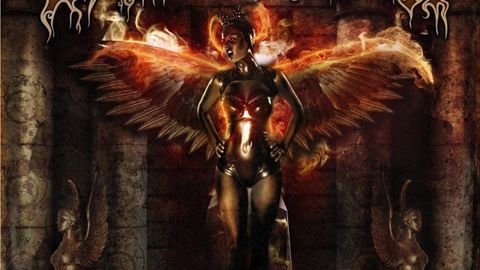It’s now 20 years since Cradle Of Filth started making waves in the UK underground with their opening brace of demos, and they have remained a reassuring presence almost every year since. As much-loved as they are much-maligned, forever swapping labels and lineups, this remarkable phenomenon remains unbowed and unbroken on its 10th album, sole owners of a sound that ranges freely across multiple vocal and musical styles but always bursts with intrinsic Filthiness.
This singularity, the self-deprecating wit, the momentous workrate and the immersion in a unique sordid fantasy universe serve to armour-plate this divisive metal behemoth, who have long since earned respect for doing things their own way, whatever missteps and pratfalls may have occurred in the process.
There’s always been an appealing struggle at the heart of this band between the elegant and the bestial, and seldom has that been more concisely documented than on The Manticore. Concise isn’t a word one associates with Cradle Of Filth, but this is their shortest long-player to date – 11 songs, none over six minutes – and it benefits from the brevity. There’s a sense of momentum and focus about each tune, it feels leaner, more direct and immediate than anything they’ve released since Midian.
The recurring motif of spiky hardcore riffs and d-beats is well signposted by salacious, bruising advance cut For Your Vulgar Delectation, and colours the record as unusually urgent and spunky, stripped to the basics but with enough restlessness and versatility to keep things interesting.
The stately title track throws in snake-charmer flutes and sitars to evoke its Middle Eastern theme, but does so with (gasp!) taste and discretion, as sounds are glimpsed discreetly between the song’s shifting gears. Pallid Reflection is all solemn, melodic heavy metal majesty, from the Angel Witchy intro through rugged Paradise Lost-ish guitar lines to the operatic warbling that begins just as the song starts to fade – as if confirming the album’s concerted scarcity of female vocals (although the duetting in Succumb To This is particularly effective).
Siding With The Titans is another classic headbanger, proving how satisfying Cradle sound with a haunted-house piano madly banging away over staccato guitars, the droning string-bend a lovely disorientating touch. These highlights, refreshingly, come in the album’s second half. They’ve done everything they needed to do here; it’s a tight, fiery and lurid fat-free distillation of Cradle’s strengths drawing from a range of flawless influences (still plenty of Sabbat in evidence).
The idea of the album as a bestiary, “a collection of stories on monsters”, is obvious but natural and fun, and far more imaginatively handled than something like Iced Earth’s Horror Show. It offered a chance for a new kind of graphic design that hasn’t been seized, running instead with yet more swishy CGI of shiny girls with wings.
There will always be an air of gauche joie de vivre about Cradle Of Filth guaranteeing disdain from certain quarters, but there’s also a lot of heart, personality and conviction.


